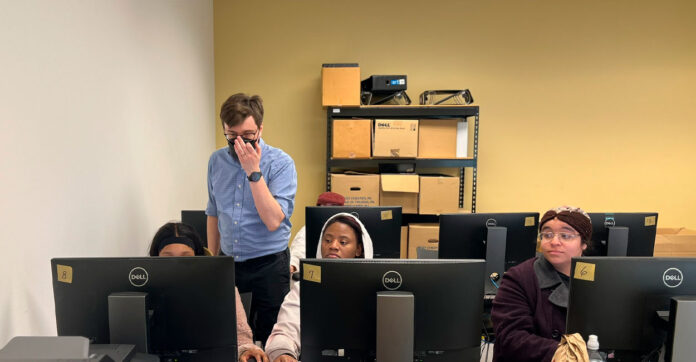Low-income residents in Philadelphia are at risk of losing internet access as the Affordable Connectivity Program (ACP) approaches its end. This federally funded initiative has been a crucial lifeline, offering essential subsidies to cover internet expenses. As the program’s expiration looms, experts caution that a surge in disconnected households could exacerbate the digital divide and impede access to vital services.
The internet is no longer a luxury, it’s a necessity. Millions of Americans rely on it for daily tasks but affording it can be a challenge. To bridge this gap, Congress launched the Affordable Connectivity Program (ACP) with overwhelming support from both parties.
This program has been a game-changer, keeping over 22.5 million households (roughly 50 million people) connected across the country. However, full funding for ACP expired April 30. Without Congressional action, all these households could lose their internet access, jeopardizing their connection to essential services and opportunities.
PHILLY MAY FACE A DISCONNECTED FUTURE
The consequences of losing this program are significant. Reliable internet access has become crucial in today’s world. It’s a gateway to education, job opportunities, healthcare resources, and even government services. Without it, low-income residents in Philly face a multitude of challenges:
• Limited educational opportunities: Online learning platforms and resources have become increasingly important in education. Students without internet access fall behind, jeopardizing their academic success.
• Reduced job prospects: Many job applications and training resources are now online. Losing internet access can significantly hinder a person’s ability to find employment.
• Barriers to healthcare: Telemedicine appointments and online health resources are becoming more prevalent. Without internet, managing health becomes more difficult.
• Limited access to government services: Many government agencies offer services and information online. Losing internet access creates a barrier to essential resources.
A WIDER DIVIDE, A SLOWER ECONOMY
The potential impact on Philly goes beyond individual households. A wider digital divide can hinder economic growth and community development. Businesses increasingly rely on a connected population, and a lack of internet access can limit economic mobility.
Without affordable internet access, many residents may struggle to access online stores, research products, or engage with local businesses digitally. This shrinks the customer pool and limits growth potential, especially for businesses heavily reliant on e-commerce.
Furthermore, limited internet access hinders economic mobility. It acts as a barrier for individuals seeking to advance their careers. They may struggle to access online training resources, participate in the gig economy, or even launch their own online businesses. This stifles innovation and limits the pool of skilled talent available to Philly’s businesses.
Finally, a digitally divided community struggles to attract new businesses and investments. The lack of internet access creates a barrier to entry, making Philly a less attractive location for companies that rely on a connected workforce and consumer base.
The consequences of a wider digital divide are far-reaching. By ensuring affordable internet access for all, Philly can empower its residents, nurture a thriving business environment, and pave the way for a more prosperous future.
ESPERANZA: BRIDGING THE GAP
In Philadelphia, the digital landscape tells a tale of two worlds – one where connectivity opens doors to endless opportunities, and another where the lack of internet access deepens existing disparities.
The Hope Digital Skills Data Report from March 2024, published by Esperanza – one of the nation’s largest Hispanic, faith-based nonprofit organizations – sheds light on the challenges of internet access in neighborhoods like Hunting Park and the far-reaching consequences of the digital divide on communities.
Esperanza’s Hope Digital Skills workshops serve a significant population in need. According to the report, 47% of participants identified as belonging to low-income households, with an annual income falling within the federal poverty level ($0-$10,000).
However, despite the widespread availability of the internet, not all residents in Philadelphia have equal access to this essential resource. The report reveals stark disparities in computer and broadband access, particularly in underserved neighborhoods like Hunting Park.
Shockingly, nearly half of the 562 HDS program participants who are local to this area lack access to a desktop computer or laptop at home, highlighting the digital divide that persists within the city.
Many resources for developing digital literacy are now online. This includes video tutorials, online courses, and practice exercises. Without a computer at home, residents have limited access to these valuable learning tools that can help them improve their digital skills.
EMPOWERING COMMUNITIES THROUGH DIGITAL LITERACY
Despite the challenges, the work of Esperanza and the Hope Digital Skills (HDS) program shines as a guiding light in the quest for digital inclusion. By offering a range of educational opportunities and resources, the program empowers individuals to enhance their digital skills and bridge the digital divide. A 10% increase in participants from February to March reflects the program’s growing reach in the community.
Esperanza and the HDS program go beyond teaching digital skills; they open doors to a world of opportunities. Through workshops, outreach projects, and community engagement, they equip participants with the knowledge and tools needed to navigate the digital ecosystem effectively. This empowers them to pursue educational advancement, career opportunities, and economic growth.
The dedication and commitment of Esperanza and the HDS program to promoting digital literacy and fostering digital inclusion deserve commendation. By addressing the root causes of the digital divide and providing access to critical resources, these initiatives are not just changing lives; they are transforming communities and creating a more equitable and connected society.
As we look to the future, it is clear that digital literacy is not just a skill; it is a pathway to inclusion, empowerment, and opportunity. The work of Esperanza and the HDS program exemplifies the transformative impact of community-driven initiatives in narrowing the digital divide and creating a more digitally inclusive society where all individuals have the chance to thrive in the digital age.
Digital literacy is about more than using technology; it’s about unlocking potential, fostering empowerment, and building a brighter future for all. Through the tireless efforts of organizations like Esperanza and programs like the Hope Digital Skills initiative, we are moving closer to a world where digital literacy is not a privilege but a fundamental right for all.
The story of internet access in Philadelphia is a tale of resilience, innovation, and the ongoing struggle to bridge the digital divide. By recognizing the importance of connectivity and investing in programs that promote digital literacy, we can pave the way for a more inclusive and equitable future where all residents have the opportunity to thrive in the digital age.























